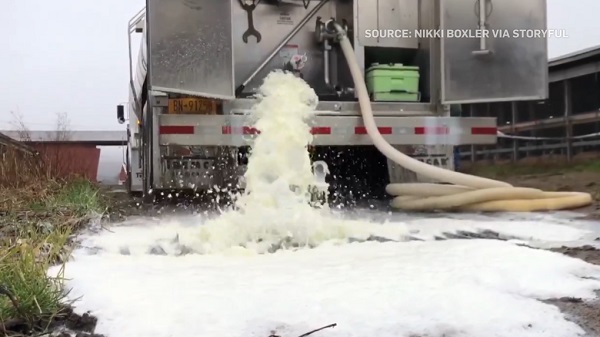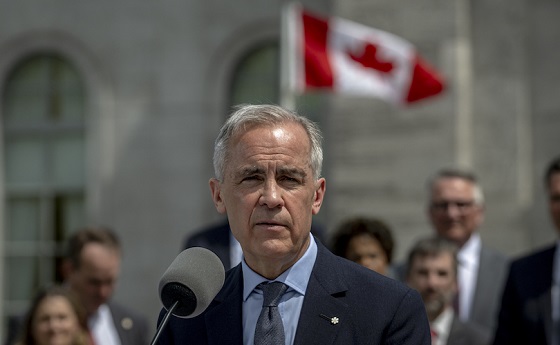Agriculture
Time to End Supply Management

From the Frontier Centre for Public Policy
According to a 2021 report from the Montreal Economic Institute, Canadian families pay up to $600 more per year on dairy products alone due to supply management.
The New Democrats and the Liberals have pledged to tackle inflation, curb price gouging, and address child poverty. Leaders like Jagmeet Singh have railed against corporate greed while Prime Minister Justin Trudeau’s government has introduced programs claiming to feed your children.
But despite these announcements, food affordability remains a serious problem in Canada. If our political leaders are truly committed to making nutritious food accessible for all Canadians, they must confront the largely ignored factor: Canada’s supply management system.
Supply Management Hurts Families
Supply management, which governs the production and pricing of dairy, eggs, and poultry in Canada, was designed to stabilize farmers’ incomes. However, it now acts as an unnecessary burden on consumers, artificially inflating the cost of essential food items. Farmers are given strict quotas on how much they can produce, and sky-high tariffs—often more than 200%—are imposed on imports.
This creates a closed market that keeps prices far higher than in a free-market system. According to a 2021 report from the Montreal Economic Institute, Canadian families pay up to $600 more per year on dairy products alone due to supply management. This is no small sum to households already feeling the pinch.
To put it in perspective, a litre of milk in Canada costs between $1.50-$2.50, compared to USD 1.00 (around $1.35 CAD) in the United States, where such market controls don’t exist. The cost of other staples, such as eggs and chicken, follows the same pattern, with Canadians paying significantly more than their American counterparts.
These artificially high prices disproportionately affect families struggling. As inflation continues to drive up the cost of housing, fuel, and other essentials, paying extra for basic food becomes the tipping point between having three meals a day or skipping meals to cover rent or bills.
The Conservative Opportunity: Free Markets and Family Values
The Conservative Party has historically championed free markets and policies promoting family well-being, but they also support the food cartels.
In a genuinely free market, prices are determined by supply and demand, leading to lower consumer costs and more production efficiency. Ending supply management would achieve both goals.
While Conservatives have long supported free markets, they have been reluctant to challenge supply management, largely due to political concerns in Quebec, where the system is popular among producers. Being pro-trade and supporting supply management are incongruous political positions.
However, with the Conservatives drawing closer to forming government, potentially without significant electoral support from Quebec, now is the time for a strategic shift. Shedding the protectionist policies would be a bold and forward-thinking move to distinguish the party as serious about free markets and family welfare.
It would also send a powerful message to voters across the country, particularly in regions where food insecurity is rising. Conservatives could frame the policy change as a direct effort to reduce food prices, ease the burden on low-income families, and protect Canadian consumers from the high costs supply management imposes.
The Ethical Case: Dumping Food While Canadians Go Hungry
Perhaps the most shocking aspect of supply management is the appalling waste it produces. To keep prices high, in 2023 alone, tens of millions of litres of milk were discarded—wasted food that could have gone to Canadians in need. This is an unconscionable practice in a country where nearly 2 million people rely on food banks to survive. How can wasting food while so many families struggle to afford basic groceries be justified?
This waste flies in the face of compassion and fairness, and contradicts the principles of a free market.
The Bloc Quebecois’ Game
Given that the significant dairy industry in Quebec benefits immensely from supply management, the Bloc Quebecois is seeking to leverage the weakness of the Trudeau minority in exchange for a Bloc bill, Bill C-282, that would shield supply management from future changes. The Bloc Québécois Bill C-282 wants to amend the Trade and Development Act. Reportedly, it has support from all parties in Parliament.
One of the key setbacks is the restriction supply management places on open market access. It hinders the ability to fully embrace free trade agreements. A primary objectives of Bill C-282 is to prevent the Canadian government from making concessions in international trade agreements that could undermine the supply management system. This is particularly relevant in trade negotiations where foreign countries often seek increased access to Canada’s agricultural markets.
Consequently, this limits the potential for growth in agricultural exports. Central Canada benefits the most from supply management, and although its trade reverberations hurt everyone, they seem to hurt Western producers the most.
A Call to Action for All Parties
For New Democrats and Liberals, the solution to supporting families and children through food affordability lies in targeting alleged corporate greed and expanding social programs. But if they are serious about addressing child poverty and food insecurity, they would confront supply management. Likewise, for Conservatives, ending supply management is a natural extension of their free-market impetus and commitment to family values.
The time for change is now. Regardless of party, all political leaders should recognize that dismantling supply management would be a direct, meaningful step toward making food more affordable for all Canadians, as well as maximizing agricultural chances to expand Canada’s exports. With the rising cost of living pushing more families into food insecurity, we cannot afford to let outdated policies continue to inflate prices, immorally perpetuate waste, and curtail chances for greater growth in Agrifoods.
Dismantling supply management would offer tangible relief to millions of Canadian consumers, particularly low-income families. All other parties should start by killing Bill C-282.
Marco Navarro-Génie is the Vice President of Research at the Frontier Centre for Public Policy
Agriculture
Bovaer Backlash Update: Danish Farmers Get Green Light to Opt Out as UK Arla Trial Abruptly Ends!

In a pivotal shift, Denmark’s Veterinary and Food Administration has issued new guidance: Farmers can immediately suspend Bovaer administration if they “suspect” it poses risks to herd health. On the heels of the Danish announcement—the major UK trial of Bovaer on 30 Arla Foods farms has abruptly ended amid health fears.
The Mandate Cracks: Farmers Given the Green Light to Opt Out
On November 5, 2025, Denmark’s Fødevarestyrelsen (Danish Veterinary and Food Administration) issued a press release and accompanying guidance clarified that farmers (specifically the herd manager, or besætningsansvarlige) could immediately exempt individual cows or entire herds from the mandatory Bovaer use if they suspected it was causing or exacerbating health issues, prioritizing animal welfare under existing regulations.
Sonia Elijah investigates is a reader-supported publication.
To receive new posts and support my work, consider becoming a free or paid subscriber.
This was in response to surging reports of cow illnesses since October 1, where farms with over 50 cows have been mandated to use the synthetic additive, Bovaer (containing 3-nitrooxypropanol), developed by DSM-Firmenich. If the farms do not comply, they face heavy fines.
Bovaer Backlash: Danish Cows Collapsing Under Mandatory Methane-Reducing Additive |
||||||
|
||||||
| Article updated: November 4 | ||||||
|
The guidance emphasized that exemptions apply to cases of feed-related metabolic disorders (e.g., fatty liver, milk fever, or rumen issues) and require documentation via a “tro- og loveerklæring” (declaration of good faith) on LandbrugsInfo, with veterinary consultation recommended for severe cases. No fines would apply for such welfare-based pauses, though farmers must still meet methane reduction goals via alternatives like increased feed fat. This effectively gave the “green light” for opting out on welfare grounds.
Reports surged of Danish dairy farmers unilaterally halting Bovaer administration, accusing the government of “poisoning” livestock to meet climate targets.
A November 3, 2025, article in LandbrugsAvisen (Denmark’s leading agricultural newspaper), quoted veterinarian Torben Bennedsgaard from BoviCura (a specialized cattle health advisory service closely tied to Danish dairy producers). He stated: “Every other farmer has problems with Bovaer.”
“Bovaer is a proven, effective and safe solution”
A spokesperson for DSM-Firmenich, the company that developed Bovaer, told Agriland, that “animal welfare is our highest priority”. They went on to state: “We are actively engaging with the relevant organisations to ensure that all these concerns are fully investigated and properly addressed..In previously reported cases, Bovaer was not identified as a contributing factor to the health concerns raised…Bovaer is a proven, effective and safe solution that has been successfully used for over three years by thousands of farmers in over 25 countries.”
UK Ripple Effects: Arla Trial Abruptly Halted
On 7 November, the BBC reported that the major UK trial of Bovaer on 30 Arla Foods farms concluded earlier than planned amid “farmer health concerns” for cows, echoing Danish reports. It stated: ‘Bovaer is now the focus of an investigation in Denmark after farmers raised fresh concerns but manufacturer DSM-Firmenich said the additive was “proven, effective and safe.”’
Arla, which supplies major retailers like Tesco and Aldi, is now reviewing data before deciding on wider rollout. The trial aimed to cut methane by 30% but faced criticism for lacking transparency on animal impact.
Jannik Elmegaard, of the Danish Food and Veterinary Administration, told the BBC: “They very aware that some herd owners have reported animals showing signs of illness after being fed with Bovaer” but it was “unclear how many cows were affected”.
Last year, I reported on the UK’s Arla trial—whilst digging through various safety assessment reports on Bovaer, I came across several troubling findings and anomalies.
BREAKING: Methane-Reducing Feed Additive Trialled in Arla Dairy Farms |
||||||
|
||||||
| On November 26th, Arla Foods Ltd. announced via social media their collaboration with major UK supermarkets like Tesco, Aldi, and Morrisons to trial Bovaer, a feed additive, aiming to reduce methane … | ||||||
|
In a public rebuttal, Frank Mitloehner, Professor of Animal Science at UC Davis and Director of the Clarify Center for Enteric Fermentation Research, posted on X ”Hogwash!”—dismissing viral claims of Bovaer-related cow health issues in Denmark by highlighting his lab’s ongoing research and widespread U.S. usage data.
The green light in Denmark is not a mere victory—it’s a damning admission that the emperor’s new feed has holes big enough for a whole herd to escape through.
As Arla licks its wounds and DSM-Firmenich doubles down on “proven safe,” the real trial begins: can climate crusaders stomach the science when it bites back?
If you appreciate the hard work that I do as an independent investigative journalist,
please consider supporting me with a paid subscription.
Subscribe to Sonia Elijah Investigates
Agriculture
Farmers Take The Hit While Biofuel Companies Cash In

From the Frontier Centre for Public Policy
Canada’s emissions policy rewards biofuels but punishes the people who grow our food
In the global rush to decarbonize, agriculture faces a contradictory narrative: livestock emissions are condemned as climate threats, while the same crops turned into biofuels are praised as green solutions argues senior fellow Dr. Joseph Fournier. This double standard ignores the natural carbon cycle and the fossil-fuel foundations of modern farming, penalizing food producers while rewarding biofuel makers through skewed carbon accounting and misguided policy incentives.
In the rush to decarbonize our world, agriculture finds itself caught in a bizarre contradiction.
Policymakers and environmental advocates decry methane and carbon dioxide emissions from livestock digestion, respiration and manure decay, labelling them urgent climate threats. Yet they celebrate the same corn and canola crops when diverted to ethanol and biodiesel as heroic offsets against fossil fuels.
Biofuels are good, but food is bad.
This double standard isn’t just inconsistent—it backfires. It ignores the full life cycle of the agricultural sector’s methane and carbon dioxide emissions and the historical reality that modern farming’s productivity owes its existence to hydrocarbons. It’s time to confront these hypocrisies head-on, or we risk chasing illusory credits while penalizing the very system that feeds us.
Let’s take Canada as an example.
It’s estimated that our agriculture sector emits 69 megatonnes (Mt) of carbon dioxide equivalent (CO2e) annually, or 10 per cent of national totals. Around 35 Mt comes from livestock digestion and respiration, including methane produced during digestion and carbon dioxide released through breathing. Manure composting adds another 12 Mt through methane and nitrous oxide.
Even crop residue decomposition is counted in emissions estimates.
Animal digestion and respiration, including burping and flatulence, and the composting of their waste are treated as industrial-scale pollutants.
These aren’t fossil emissions—they’re part of the natural carbon cycle, where last year’s stover or straw returns to the atmosphere after feeding soil life. Yet under United Nations Intergovernmental Panel on Climate Change (IPCC) guidelines adopted by Canada, they’re lumped into “agricultural sources,” making farmers look like climate offenders for doing their job.
Ironically, only 21 per cent—about 14 Mt—of the sector’s emissions come from actual fossil fuel use on the farm.
This inconsistency becomes even more apparent in the case of biofuels.
Feed the corn to cows, and its digestive gases count as a planetary liability. Turn it into ethanol, and suddenly it’s an offset.
Canada’s Clean Fuel Regulations (CFR) mandate a 15 per cent CO2e intensity drop by 2030 using biofuels. In this program, biofuel producers earn offset credits per litre, which become a major part of their revenue, alongside fuel sales.
Critics argue the CFR is essentially a second carbon tax, expected to add up to 17 cents per litre at the pump by 2030, with no consumer rebate this time.
But here’s the rub: crop residue emits carbon dioxide, methane and nitrous oxide whether the grain goes to fuel or food.
Diverting crops to biofuels doesn’t erase these emissions: it just shifts the accounting, rewarding biofuel producers with credits while farmers and ranchers take the emissions hit.
These aren’t theoretical concerns: they’re baked into policy.
If ethanol and biodiesel truly offset emissions, why penalize the same crops when used to feed livestock?
And why penalize farmers for crop residue decomposition while ignoring the emissions from rotting leaves, trees and grass in nature?
This contradiction stems from flawed assumptions and bad math.
Fossil fuels are often blamed, while the agricultural sector’s natural carbon loop is treated like a threat. Policy seems more interested in pinning blame than in understanding how food systems actually work.
This disconnect isn’t new—it’s embedded in the history of agriculture.
Since the Industrial Revolution, mechanization and hydrocarbons have driven abundance. The seed drill and reaper slashed labour needs. Tractors replaced horses, boosting output and reducing the workforce.
Yields exploded with synthetic fertilizers produced from methane and other hydrocarbons.
For every farm worker replaced, a barrel of oil stepped in.
A single modern tractor holds the energy equivalent of 50 to 100 barrels of oil, powering ploughing, planting and harvesting that once relied on sweat and oxen.
We’ve traded human labour for hydrocarbons, feeding billions in the process.
Biofuel offsets claim to reduce this dependence. But by subsidizing crop diversion, they deepen it; more corn for ethanol means more diesel for tractors.
It’s a policy trap: vilify farmers to fund green incentives, all while ignoring the fact that oil props up the table we eat from.
Policymakers must scrap the double standards, adopt full-cycle biogenic accounting, and invest in truly regenerative technologies or lift the emissions burden off farmers entirely.
Dr. Joseph Fournier is a senior fellow at the Frontier Centre for Public Policy. An accomplished scientist and former energy executive, he holds graduate training in chemical physics and has written more than 100 articles on energy, environment and climate science.
-

 International2 days ago
International2 days agoUS announces Operation Southern Spear, targeting narco-terrorists
-

 Censorship Industrial Complex2 days ago
Censorship Industrial Complex2 days agoEU’s “Democracy Shield” Centralizes Control Over Online Speech
-

 Bruce Dowbiggin2 days ago
Bruce Dowbiggin2 days agoDEI Or Die: Out With Remembrance, In With Replacement
-

 Addictions1 day ago
Addictions1 day agoCanadian gov’t not stopping drug injection sites from being set up near schools, daycares
-

 Business1 day ago
Business1 day agoParliamentary Budget Officer begs Carney to cut back on spending
-

 International2 days ago
International2 days agoState Department designates European Antifa groups foreign terror organizations
-

 Business1 day ago
Business1 day agoCarney government needs stronger ‘fiscal anchors’ and greater accountability
-

 Education1 day ago
Education1 day agoWhy classroom size isn’t the issue teacher unions think it is















